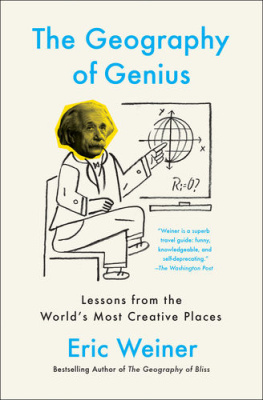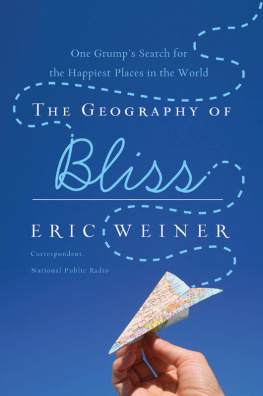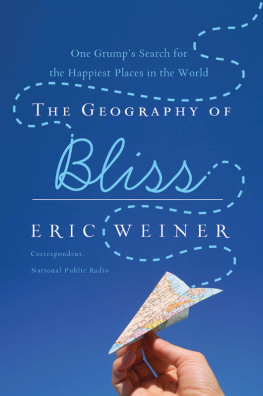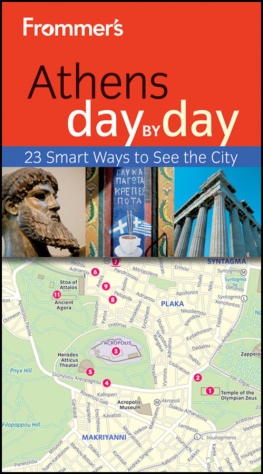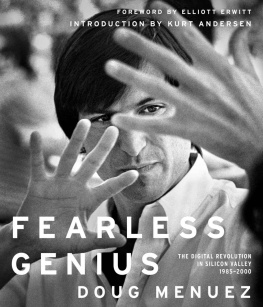Thank you for downloading this Simon & Schuster eBook.
Join our mailing list and get updates on new releases, deals, bonus content and other great books from Simon & Schuster.
C LICK H ERE T O S IGN U P
or visit us online to sign up at
eBookNews.SimonandSchuster.com
We hope you enjoyed reading this Simon & Schuster eBook.
Join our mailing list and get updates on new releases, deals, bonus content and other great books from Simon & Schuster.
C LICK H ERE T O S IGN U P
or visit us online to sign up at
eBookNews.SimonandSchuster.com
CONTENTS
for Sharon
What is honored in a country will be cultivated there.
PLATO

INTRODUCTION: ADVENTURES WITH THE GALTON BOX
PEOPLE BEGAN TO RECOGNIZE MY specialness when I was still young. As a ten-year-old, curious about the laws of physics, I wondered what would happen if I tossed a large water balloon off the balcony of my fathers fifteenth-floor apartment. So, following in the footsteps of Newton and Darwin and great scientists everywhere, I decided to conduct an experiment.
Way to go, Einstein, said the clearly impressed owner of the car whose windshield had been thoroughly shattered by the surprisingly robust force of the water balloon. Who knew? Such is the cost of scientific progress, I rationalized at the time. Another incident, years later, involved a fireplace, a closed flue, and the local fire department. I can still hear the firefighters words: What are you, some sort of genius?
Alas, no, I am not. This puts me in what is fast becoming a minority. Today, we suffer from a serious case of genius inflation. The word is tossed around promiscuously. Tennis players and app designers are described as geniuses. There are fashion geniuses and culinary geniuses and, of course, political geniuses. Our children are all Little Einsteins and Little Mozarts. If were having trouble with our latest iProduct, we belly up to Apples Genius Bar. An avalanche of self-help books, meanwhile, tell us we all have a little genius inside of us (in my case very deep inside), a message we happily imbibe, oblivious to the fact that if everyone is a genius, then nobody is.
I have been watching this evolvingor, rather, devolvingconcept of genius for a while now. I am fascinated by the subject of genius in much the way a naked man is fascinated by the subject of clothing. Are we really in a downward genius spiral, or is there hope for us, and even for me?
Genius . The word beguiles, but do I really know what it means? It comes to us from the Latin genius , but it meant something very different in Roman times. Back then, a genius was a presiding deity that followed you everywhere, much like a helicopter parent only with supernatural powers. (The word genie stems from the same root.) Every person had a genius. Every place, too. Cities, towns, and marketplaces, all possessed their own presiding spirit, a genius loci, that continuously animated them. The current dictionary definitionextraordinary intellectual power esp. as manifested in creative activityis a product of the eighteenth-century Romantics, those brooding poets who suffered, suffered for their art and, wed now say, for their creativity , a word that is even more recent; it didnt come along until 1870 and wasnt in widespread use until the 1950s.
Some use genius to describe a very smart personsomeone with a high IQbut that is overly narrow, and misleading. Plenty of people with extremely high IQs have accomplished little, and conversely, plenty of people of average intelligence have done great things. No, I am speaking of genius in the creative senseas the highest form of creativity.
My favorite definition of creative genius comes from researcher and artificial-intelligence expert Margaret Boden. The creative genius, she says, is someone with the ability to come up with ideas that are new, surprising, and valuable. Those also are the criteria the US Patent Office uses when deciding whether an invention deserves a patent.
Consider something as simple as a coffee cup. I might invent one that is painted an unusual shade of fluorescent orange. Yes, it is new, but not especially surprising or all that useful. Now lets say I invent a coffee cup with no bottom. That is certainly new, and definitely surprising, but, again, not particularly useful. No, to qualify for a patent, I would have to invent, say, a self-cleaning coffee cup or a folding one that doubles as a flash drivesomething that fulfilled all three criteria: new, surprising, and useful. The toddler steps of incremental innovation dont earn you a patent, or the title of genius. Only a leap does.
The question that intrigues someone such as myself, a creature of geography and a student of history, is not simply what these leaps look like but where, and when, they take place. So I decided to conduct another experiment of sorts, this time minus the water balloon. I embarked on a version of the old Grand Tour, those trips abroad that young English gentry took in the eighteenth and nineteenth centuries in order to broaden their horizons. I am no gentry and, as I said, no genius. College was a blur of cheap beer and unsuitable women. I wish I had paid more attention. This time, I vowed, would be different. This time I would heed the advice of my father-in-law. Young man, hed say in his musical, indeterminate accent, You need to ed-u-cate yourself.
My education begins in London, a city that has produced not only its share of geniuses but also the study of genius itself. If youre like me and fascinated by the so-called science of geniusor like to furtively stick small pins into pieces of feltthen you dont want to miss the Galton Box. You can find it, as I did, at Londons University College.
One overcast morning, a spring tease in the air, I hop the tube to Kings Cross Station, then walk a few hundred yards to the universitys Hogwartsian campus. There, I am greeted by Subhadra Das, keeper of the Box. I like her immediately. Something about her smile and the way she looks me in the eye is reassuring. She leads me down an unassuming corridor to an unassuming room where we find the Box, resting on a table. She dons a pair of latex gloves then, carefully, as if performing neurosurgery on a gerbil, reaches into the Box.
The Galton Box contains the worldly possessions of one Sir Francis Galton. Its an odd collection, befitting an odd but brilliant man. Galton, a nineteenth-century scientist and polymath, a cousin of Charles Darwins, brought the world statistical analysis and the questionnaire, composite portraiture and forensic fingerprints. He was one of the first meteorologists. He coined the phrase nature versus nurture . He had an IQ of nearly 200.
Galtons motto was Count whenever you can! To him, anything worth doing was worth doing numerically, and he once confessed that he couldnt fully grasp a problem unless he was first able to disembarrass it of words. Socially, he was awkward in the extreme, more comfortable with integers than people.
Subhadra extracts a piece of felt and several pins from the Box. She gingerly places them on the table. These, she explains, were Galtons tools for one of his quirkier experiments: an attempt to devise a beauty map of Great Britain. He wanted to determine where the most beautiful women of the land lived, then plot the results on a map. This being Victorian times, though, and Galtons being so shy, he couldnt very well hold a beauty contest.
Galtons solution was to stand on street corners in various cities and, with felt and pins tucked discreetly in his overcoat pocket, watch women walk by. If he saw an attractive woman (in his opinion), he stuck four pins into the felt. Less attractive women got three pins, and so on. He traveled across the United Kingdom surreptitiously ranking womens appearances this way, and presumably not raising any eyebrows. He concluded that the most attractive women lived in London, the least attractive in the Scottish city of Aberdeen.
Next page

